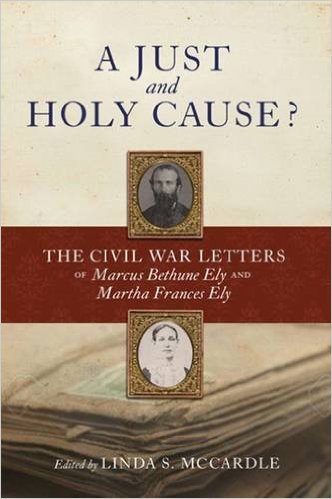A Just and Holy Cause? The Civil War Letters of Marcus Bethune and Martha Frances Ely edited by Linda S. McCardle. Mercer University Press, 2016. Cloth, ISBN: 978-0881465693. $35.00.
 Marcus Bethune Ely grew up in a prosperous, slaveholding Georgia family. He taught school for a while and in 1855 married Mattie Dumas. In May 1862, Marcus enlisted in the Russell Guards (Co. H, 54th Georgia Infantry) then being organized in Columbus. Throughout his war service, Marcus wrote to his wife faithfully (often every other day) and, like many other soldiers, he absolutely obsessed over receiving news from home. At the same time, he assiduously sought furloughs and, indeed, appears to have spent far more time with his wife at home or in camp than most volunteers.
Marcus Bethune Ely grew up in a prosperous, slaveholding Georgia family. He taught school for a while and in 1855 married Mattie Dumas. In May 1862, Marcus enlisted in the Russell Guards (Co. H, 54th Georgia Infantry) then being organized in Columbus. Throughout his war service, Marcus wrote to his wife faithfully (often every other day) and, like many other soldiers, he absolutely obsessed over receiving news from home. At the same time, he assiduously sought furloughs and, indeed, appears to have spent far more time with his wife at home or in camp than most volunteers.
In most every way, A Just and Holy Cause? is a typical volume of Civil War letters. This correspondence (only a few of Mattie’s letters have survived) contains little in the way of new information; in fact, they are most useful in detailing the ordinary problems that plagued thousands of other families during the Civil War. There is a good deal of mundane material, and Marcus often confessed that he had little of interest to report. He worried a good deal about his health, especially as the war dragged on, and like many a soldier spent some time in hospitals with fever and bowel complaints. Marcus appeared a bit more concerned than most soldiers about filthy camp conditions and bathing. He sometimes sent government-issued clothing back to Mattie and preferred to wear clothes from home. His letters tell a great deal about the basics of soldier life—from shelter to food to salt to vermin—and how shortages and delays tested the patience (if not the endurance) of a man who seldom came under enemy fire. At one point, fleas bit Marcus during the night, and he had a strange dream about courting Mattie all over again once he returned home.
Although the letters largely deal with personal matters, home life, and camp routine, there are occasional comments on the war. Upon enlisting, Marcus parroted commonplace sentiments about vindicating the work of the “Revolutionary forefathers” (9) and fighting for liberty. Later, he reported that the Yankees had grown so desperate that they were enrolling regiment after regiment of African American troops—a sure sign they had “lost confidence in the white troops” and had become “infatuated by the devil and led captive at his will” (37). These were revolutionary times, Marcus believed, and many sacrifices would be demanded. Fortunately, he spent nearly two years posted in the Savannah area far removed from major military operations, though this hardly prevented him from longing for both home and peace. There are in the letters the usual (though in this case somewhat fuller) comments about the election of officers (Marcus served as a 2nd Lieutenant). At one point, Mattie suggested that he resign his commission, but then dropped the subject because she did not want to complain.
Marcus was a dutiful soldier, but no diehard Confederate. He made only passing comments about campaigns and battles and, like many other soldiers, told his wife to read the detailed accounts in the newspapers. By the spring of 1864, his regiment was sent off to help General Joseph Johnston defend Atlanta. In September, Marcus noted the macabre juxtaposition of deserters being executed while Jefferson Davis was giving a speech about driving the Yankees out of Georgia. “Well I reckon he see how this thing can be accomplished,” Marcus allowed, “but I must confess I do not.” Too many men had already left the ranks, and the very presence of such a large enemy army in Georgia seemingly gave the lie to any false hopes. Unfortunately, the letters diminished in both length and quality as General John B. Hood’s Tennessee campaign began and Marcus’s health deteriorated.
The editor of this volume, Linda S. McCardle, recounts how the Ely letters were discovered in a pillowcase hidden under a mattress in an elderly relative’s home. For her, this volume was clearly a labor of love, and she provides extensive genealogical information on the Ely family. There is also a useful biographical roster of the Russell Guards based on substantial research in a variety of sources. Two significant weaknesses, however, weaken the book’s value. McCardle does not provide much explanatory material for events mentioned in the letters, and there is no adequate subject index. The letters themselves are fairly routine, but there are also some interesting nuggets for the persistent reader.
George C. Rable is the author of Damn Yankees! Demonization and Defiance in the Confederate South (2015).
